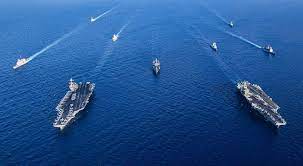Dya-Eddine Said Bamakhrama
The conflicts and security tensions the Red Sea region is currently experiencing are casting shadows on global security, politics, and economics. They have a negative impact on maritime transport, shipping costs and the movement of goods, as well as hindering local, regional and global economic activity. This means that destabilizing security and stability in this very important passageway poses a significant threat to the region’s economy and investment. Herein lies the importance and necessity of securing navigation in this important sealane. Whenever a security situation arises in the region, its negative effects are reflected on the economies of the countries bordering it and on the world beyond.
This leads us to focus on the economic and geopolitical importance of the Red Sea. It serves as a crucial route for maritime trade and transport between the three major continents: Africa, Asia and Europe. More than 15 percent of global trade passes through the Red Sea. It is well known that any crisis or threat in this waterway not only affects commercial activity and maritime transport in the region, but also affects the world as a whole, and requires both international and regional solidarity and cooperation in order to protect this international passageway. It is important to acknowledge that Red Sea security is primarily the responsibility of the countries bordering it, as they are the first to be affected by whatever events occur in and around it.
Politically, the Red Sea is considered a region where diverse political interests intersect, with major powers and regional countries competing for geopolitical benefits. This requires effective cooperation among the concerned parties to maintain stability and avoid any political escalation that might affect navigation in the sea and the surrounding areas.
The Red Sea has been — and still is — a strategic region for military powers throughout history. Empires and regional states have used it to deploy military forces and secure strategic points. Its importance became evident in the wake of the opening of the Suez Canal in 1869, which connected the Red Sea to the Mediterranean, and thus became the shortest and fastest route between East and West. Control of the Red Sea during the Second World War also had an impact on resolving important battles in the conflict.
Maintaining maritime security in the Red Sea has been a concern for a long time. The Jeddah Pact — signed on April 21, 1956, between Saudi Arabia, Egypt, and the Mutawakkilite Kingdom of Yemen — was the first call for establishing a “joint security system” in the Red Sea. Saudi Arabia has commendably continued its efforts to protect the security of the Red Sea and protect the region from negative interventions, whether international or regional. In this context, the Council of Arab and African Border States of the Red Sea and Gulf of Aden, which includes Djibouti, Saudi Arabia, Somalia, Sudan, Egypt, Yemen, Jordan, and Eritrea, was established on Jan. 6, 2020, under the leadership of Saudi Arabia, with headquarters in Riyadh. It is, however, still awaiting activation and the assumption of its assigned tasks.
Under no circumstances can the Red Sea be separated from the overall interests of major world powers. It is an international passageway and a vital economic artery. Therefore, it is necessary to unify regional efforts first and foremost, along with international efforts, in order to preserve the security of the region for the good of its people and the peoples of the world as a whole. The security tensions currently experienced in the Red Sea necessitate the activation of the Council of Arab and African Border States of the Red Sea and Gulf of Aden, and the cooperation of the international community to ensure safety of navigation, to maintain the flow of supplies, and to combat maritime criminal activities such as piracy, drug smuggling, and human trafficking.
The Red Sea countries that benefit from communication through the council are the most affected by the repercussions of any crisis in this important sea. Their security should not be subject to negative influences and interventions from external parties whose personal interests affect common global security. It is also crucial to work earnestly to resolve various crises in the region and put an end to them, rallying at various regional and international levels to preserve the security and safety of navigation in the Red Sea.
Djibouti’s position, along with that of Saudi Arabia and other countries, has been to work toward achieving stability in Somalia, Sudan and Yemen, all of which border the Red Sea. The repercussions of the Gaza war, which have shifted the balance in the region and the world due to Israeli actions resulting in the killing of nearly 30,000 people, have had a negative and concerning impact, with serious effects on the stability of the entire region, for which the Red Sea is a vital passageway.







